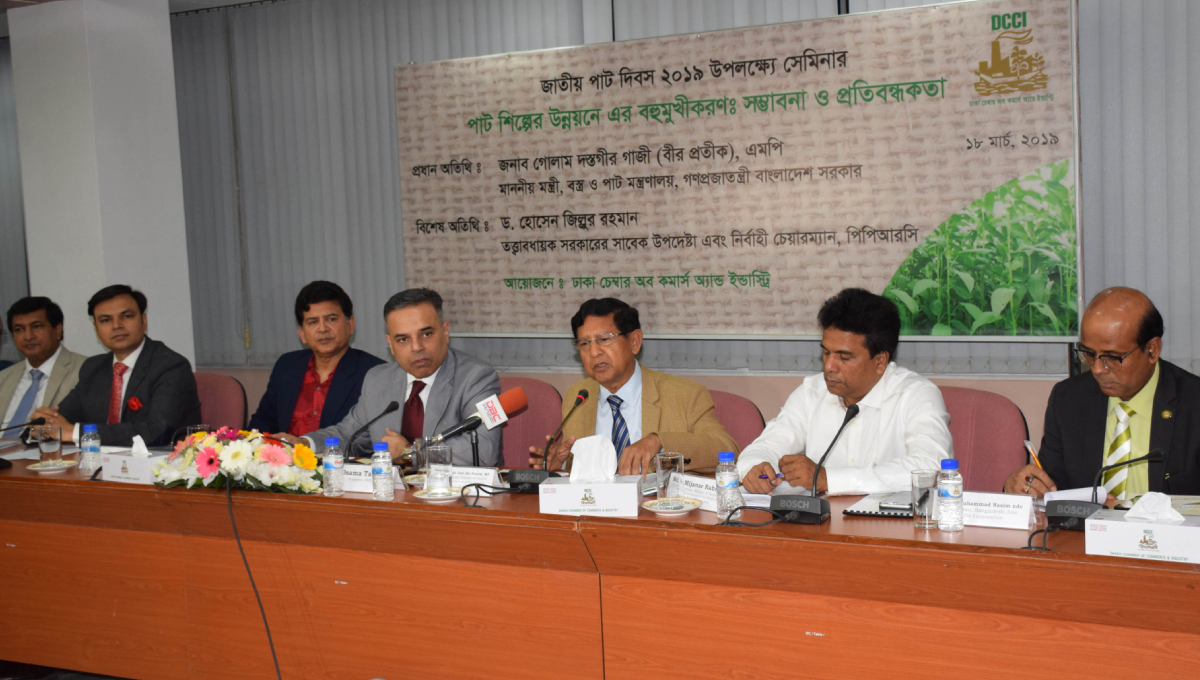Jute to be Bangladesh’s future: Jute Minister

Textiles and Jute Minister Golam Dastagir Gazi on Monday said that the jute market that is now growing across the world will be Bangladesh’s future. So the country needs more research and innovation for jute seed production and diversification.
The minister said this while speaking at a seminar on “Diversification of jute goods for the development of this Industry: Opportunities and challenges” organized by Dhaka Chamber of Commerce and Industry (DCCI) in the capital.
Golam Dastagir said that the jute goods are getting huge opportunity to tap the market following discarding of plastic bags worldwide. He also urged to increase the demand of jute and jute goods in the local market.
“We are looking for a suitable place in Motijheel area where we can establish a permanent Display Centre for jute goods,” he added.
The minister added that once jute was known as the Golden Fibre of Bangladesh. “Islamabad was built with our jute income. However, we will be able to regain the golden period. So we have to organize fairs in different districts to promote jute goods because we have a big local market.”
Dr. Hossain Zillur Rahman, former Adviser to the caretaker government and Executive Chairman of Power and Participation Research Centre (PPRC) said that industrialization of agriculture in this subcontinent started with jute and jute can become the new growth drivers of the economy again.
“Value added jute products have huge demand and it can create huge job opportunities,” he also said.
He urged for extensive research and positive branding on jute to create more demand in the international market. He also emphasized diversification of jute products, a Jute Paper Act for encouraging pulp production from jute and global jute market analysis.
DCCI president Osama Taseer said that Bangladeshi jute goods are in demand in about 60 countries. The country has earned more than $1 billion from jute and jute goods export.
“To increase export of jute and jute goods, we have to focus more on diversification. Presently about 235 types of jute goods are being made by our entrepreneurs,” he also said.
Osama urged more coordination between jute industry and textile industry. About 0.5 million (5 lakh) people are engaged directly with jute sector of Bangladesh but we need skilled work force in this sector. We need to think how we can use technology of fourth Industrial Revolution for the development of jute sector.
“It is important to formulate a Jute Pulp and Paper Act in order to revive jute sector and to encourage making paper from jute pulp. We believe jute is one of the promising industries after RMG. Policy incentive and innovation will take it further,” he also added.
Presenting the keynote paper, Director of DCCI Rashedul Karim Munna said that the demand for natural products increased 2 to 3 percent worldwide, according to a World Bank report.
He also said that according to International Jute Study Group, annual demand of shopping bags is 500 billion pieces worldwide. The market size of jute bag will reach to $2.6 billion by 2021, moreover, the market size of home textiles, that is cloths and fabrics used as part of home furnishings, will be $130 billion in the same time.
He recommended conducting a “market analysis” and setting up a Research Institute, investment friendly policy, skill development, specialized jute mills, and increased branding in international supply chains.
DCCI Vice President Imran Ahmed, DCCI Directors Enamul Haque Patwary, Hossain A Sikder, Mr. K.M.N. Manjurul Hoque, Engr. Md. Al Amin and Mr. S.M. Zillur Rahman and Shah Muhmmad Nasim, Chairman of Bangesh Jute Mills Corporation were also present there.
Source: http://unb.com.bd
Tags :
Previous Story
- Speakers: Need more research, innovation for jute seed...
- Abul Kasem Khan: Biggest challenge in our economy...
- Speakers demand improving ease of doing business
- Taka depreciates by 3.77pc in last one year
- Bangladesh heading towards $60b export by 2021: Tofail
- Business visits underlined for attracting foreign investment